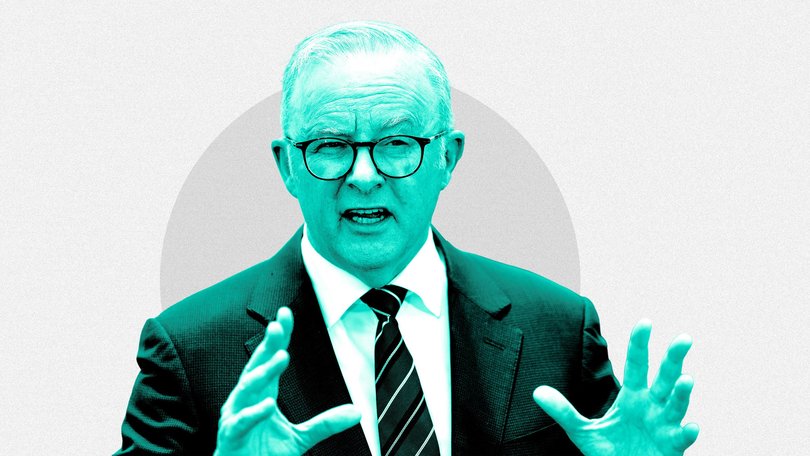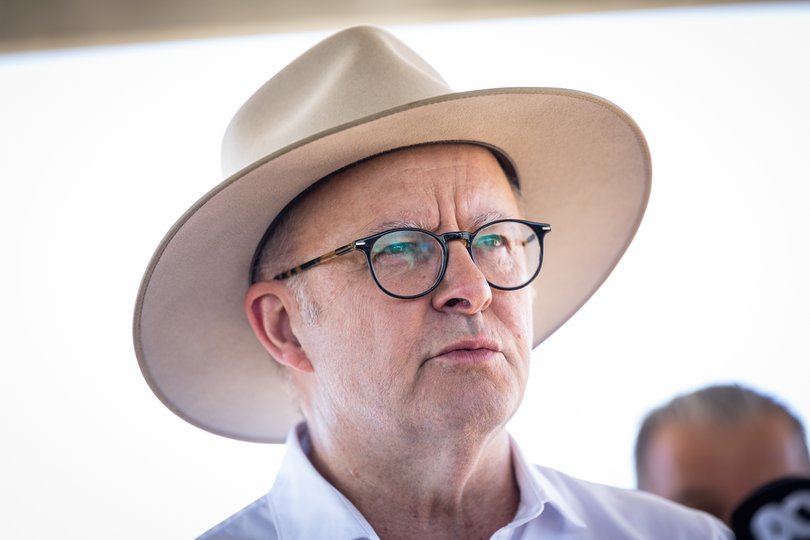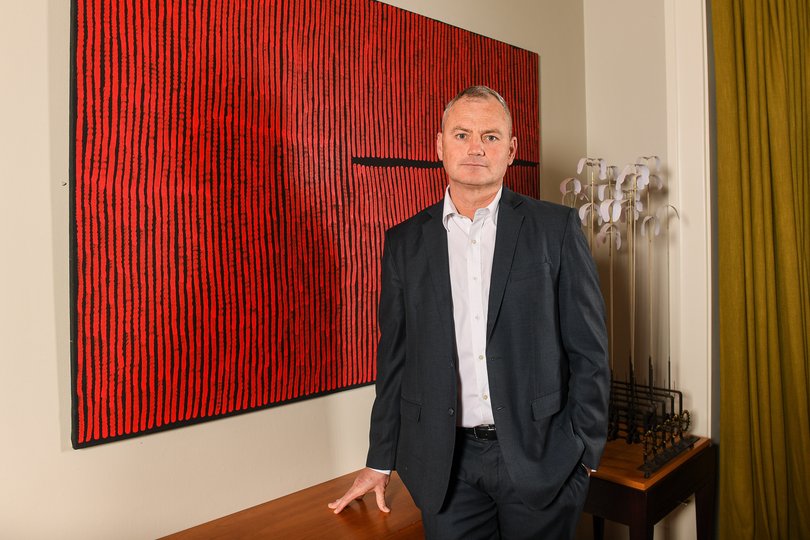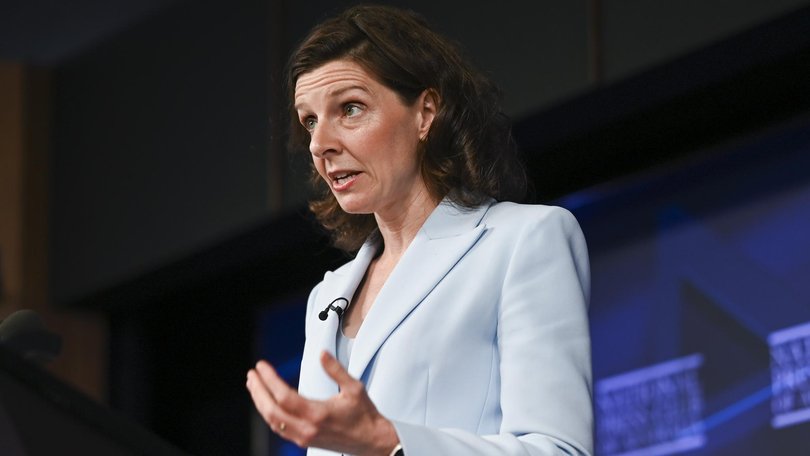PAUL MURRAY: Prime Minister comes up short showing his true colours with empty pledge on Green or teals deal
PAUL MURRAY: The Prime Minister claims he would rather be in opposition than strike a deal with the Greens or teals to secure government. What absolute nonsense.

Are the Greens actively trying to nobble Anthony Albanese’s chances of re-election by constantly claiming they will hold the balance of power if Labor scrapes over the line in a few months’ time?
“Poll after poll shows we are heading towards a power-sharing parliament after the next election,” Greens acting leader Sarah Hanson-Young said on Monday as the Prime Minister kicked off his campaign.
The election will be decided by the one-third share of voters that remains resolutely uncommitted to any party and it’s hard to see how they would be attracted to the prospect of a weak Labor government under the thumb of the far-Left Greens.
Sign up to The Nightly's newsletters.
Get the first look at the digital newspaper, curated daily stories and breaking headlines delivered to your inbox.
By continuing you agree to our Terms and Privacy Policy.But now Albanese wants us to believe that he would rather go into opposition than form a government with their support.
The Prime Minister is still living down broken promises he made last time around that he refuses to own, like lowering our power bills by $275 a year.
But this one is a whopper. He pledges to turn his back on government as a matter of principle.
That’s because Albanese knows what the Greens are really saying about holding the balance of power: “We own you.”

Every time that prospect is suggested, it gives Australian voters who are not welded to the increasingly Marxist rump party — that’s about 92 per cent of us — cause to reflect on what that minority government might look like.
With the Coalition’s election campaign sure to centre on the mess Labor has made of economic management and energy policy, the constant focus on minority government poses the question of how much worse things would be with the Greens calling the tune.
That prospect is not hard to imagine because we’ve seen it before, quite recently.
The Greens forced Julia Gillard to break a promise on a carbon tax as their price for a minority Labor government in 2010. She never recovered.
That disaster is the template for what many pundits say will be the outcome of this election: Labor scraping back into power without a majority, dependent on the Greens and, very likely, whichever of the impotent teals survive.
Anyone making predictions about the election result is crazy-brave because these are strange times indeed with Trumpworld 2.0 hanging over everything from January 20 onwards.
We’ve seen just this week how that is playing out in Canadian politics with the demise of Justin Trudeau, but that is not a definite precursor of how it will affect our politics.
Tariffs — the pressure point in Trudeau’s exit — are just one small part of how President Donald Trump will rock the world over the next four years.
Labor will likely do worse this year than in 2022, when a visceral hatred of former prime minister Scott Morrison corrupted the Coalition vote. And Labor scrappers watching their declining primary vote — and Albanese’s falling popularity — no longer casually brand Peter Dutton as “unelectable”.

That anti-Morrison sentiment riffed off the #MeToo phenomenon raging at the time which saw a clutch of female candidates professing to be conservatives win heartland seats from the Liberals.
The so-called teals have since shown through their parliamentary voting patterns that they are anything but conservative, throwing their lot in with Labor and the Greens overwhelmingly.
The teals also talked a big game on integrity before the election, but their track record in office has been patchy.
Just last weekend, none of the teals — Curtin MP Kate Chaney, Monique Ryan, Zali Steggall, Allegra Spender, Kylea Tink, Sophie Scamps and former ABC presenter Zoe Daniel — would take a public stand against their campaign funder when he made an unprincipled attack on social media.
Simon Holmes a Court was roundly criticised after he compared Morrison to convicted paedophile Rolf Harris in a particularly toxic sledge on Elon Musk’s X.
There were widespread calls for an apology and for the teal MPs — heavily financially backed by Holmes a Court’s Climate 200 fundraising body — to distance themselves from his comments. None did.
That failure to demonstrate the high political standards and integrity they pledged before the election once again highlighted a weak spot around campaign financing. They deny owing Holmes a Court favours, but act differently.
Last September, Spender and Daniel were both outed by the Australian Financial Review for lobbying in Holmes a Court’s favour over his inclusion in a national rich list.
This is how the AFR’s Phil Coorey reported the affair: “About two weeks after The Australian Financial Review Magazine’s Power List panel met to finalise the 2024 lists, teal independent Allegra Spender walked into the paper’s Canberra bureau seeking a favour.
“She was not on either the covert or overt lists and, technically, she should not have known who was. Our panellists are asked to keep the lists secret until they’re published.

“Spender was visiting the Financial Review’s press gallery office on behalf of Simon Holmes a Court, founder of Climate 200, the funding powerhouse behind the teal movement.
“Polite as ever, she requested Holmes a Court be removed from the covert list because he did not want to be on it.
“Her submission came as no surprise. A staffer for fellow teal independent Zoe Daniel had already rung with the same request, as had a spokeswoman for Climate 200.”
Political lobbying and influence peddling are central to the integrity issues that the teals sought to exploit before the last election, including their demands for a Federal anti-corruption body.
Now both Daniel and Spender are in the sights of the one they helped establish.
Spender has received $740,000 from Climate 200, but when Sky News’ Laura Jays probed on live television whether Holmes a Court asked her to intervene, she would not answer.
That was a day after Spender had the gall to go to the National Press Club and claim she had done nothing wrong. She claimed her motivation for attempting to strike her major donor off the rich list was the perception that he controlled her. Go figure.
“I have a problem with this idea that women like myself get here and there is someone covertly hiding behind us pulling the strings,” she said.
And the very next day she fuelled the perception by her silence. Money talks in funny ways.
What inspired Holmes a Court’s brain fart about Rolf Harris was his rage at seeing Morrison in a social media post with Trump and their wives.
Ironically, one of Trump’s biggest targets as a second-term president, will be the same woke pretensions that put the teals into parliament.
If Albanese falls short of majority government, he will have both the teals and Greens trying to make him do things that Labor policy would normally not follow.
Climate 200 tries to underplay the influence of the splenetic Holmes a Court by saying he is only the convener and pointing to the body’s advisory council.
If anyone ever had any doubts that the group’s main objective was to disrupt the Liberal vote — rather than achieving climate objectives — listing the council’s board should remove them.
It includes former “independent” Federal politicians Tony Windsor and Rob Oakeshott, who jointly held Gillard hostage by supporting her minority Labor government, having presented to their electors as conservatives. Both have significant axes to grind against the Coalition parties.
When Windsor first tried to enter NSW State politics in 1991, he sought to stand for the Nationals, but allegations on the day of his preselection about a drink-driving incident saw another candidate endorsed. Oakeshott was a disaffected former Nationals MP who fell out with the party.
Another council member is former Australian Medical Association president Kerryn Phelps, who held the Federal seat of Wentworth as an independent for one term before it was reclaimed for the Coalition by Dave Sharma. Phelps’ campaign slogan was “put the Liberals last”.
And then there’s former Liberal leader John Hewson, probably the most inept politician to head the party, having advanced a floridly right-wing manifesto called Fightback that Paul Keating shredded at the 1993 election.
Hewson moved dramatically to the left after the Liberals sacked him in favour of Alexander Downer and even further after he resigned from the parliament.
Perhaps his fellow leftists on the Climate 200 council should remember that Fightback advanced gutting Medicare with the abolition of bulk-billing for non-concession holders, a nine-month limit on unemployment benefits, the abolition of industrial awards and $13 billion of personal tax cuts for upper income earners.
It is indisputable that the political environment in Australia is now very different than when Albanese won government, proclaiming on election night as his first priority to institute the Uluru Statement in full.
Another broken promise.
If the world is righting itself after a long dalliance with identity politics, climate alarmism and socialist economics, then Australian voters might be seeking some certainty and a sense of security in the next parliament.
Albanese’s hollow promise about eschewing minority government is hardly reassuring.
